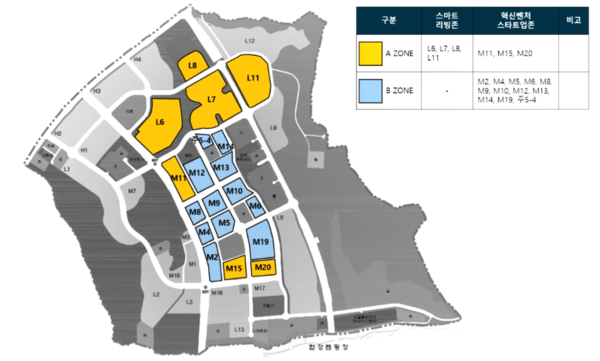- Enactment of project implementation agreement with Ministry of Land, Infrastructure and Transport, LH, and private businesses on April 21
- Establishment of Public-Private Joint Investment SPC in May to create a world-class smart city with innovation venture startup zone and smart living zone
Sejong City (Mayor Lee Choon-hee) signed an agreement with the Ministry of Land, Infrastructure and Transport, the Korea Land and Housing Corporation (LH), and private businesses on April 21 to create a national demonstration smart city.
The Sejong Smart City has been promoted to build a world-class smart city that houses the 4th Industrial Revolution technology on the blank land, and the 5-1 living zone (an area of Hapgang-ri, about 830,000 pyeong) was finally selected through the Ministry of Land, Infrastructure and Transport's public offering in 2018.
In April 2020, the "Sejong O1 Consortium," of which LG CNS is a representative, was selected as a private business operator.
The national pilot city is significant as it is a "public-private joint project" that applies creative business models of private companies, away from the existing public-led urban construction method.
Sejong City's agreement to implement the national pilot smart city project was designed to define the roles and responsibilities of the parties participating in the project.
The project will involve 13 partners, including ▲ the Ministry of Land, Infrastructure and Transport, ▲ public sector businesses (Sejong City, Korea Land and Housing Corporation), ▲ private sector businesses (LG CNS, LG U+, KB Securities, Hanyang, etc.).
The main contents of this project implementation agreement include a creation of a leading district (340,000㎡) in the national pilot city and the provision of more than 21 types of smart services.
The total project cost is 3.1636 trillion won, and it will be raised through financial procurement by business corporations except for the Ministry of Land, Infrastructure and Transport's financial support (national expenses) and 90 billion won in capital from public and private investments.
The founding capital consists of 18 billion (20%) of public investment (Sejong City and LH) and 72 billion (80%) of private investment.
To facilitate the project, public sector businesses and private businesses will invest together to establish a business corporation in May.
After that, the business corporation will focus on securing sustainability by developing leading districts for five years, providing services for 10 years, and establishing a new industrial ecosystem based on future performance.
In addition, profits from business corporations will be reinvested in the operation and upgrading of smart services and the discovery of new services to lead to creative urban development of the private sector.
Sejong City will also aim for the smooth promotion of the national pilot city and play a public role by participating in the board of directors as an investor in the business corporation (a total of 2.4 billion won).
The leading district will consist of ▲ "Innovative Venture Startup Zone" and ▲ "Smart Living Zone," and aims to realize a car-free city based on the jobs-housing proximity.
▲The Innovation Venture Startup Zone is located in the center of the 5-1 living area (about 163,000㎡), and will be created as a testbed for companies to demonstrate and study freely through regulatory sandboxes, and will operate as eco-friendly sharing cars, self-driving shuttles, and personal mobility.
In addition, cultural content companies such as CJ will participate in creating a complex cultural complex where the production and consumption of culture and arts take place together.
Sejong City expects the innovative venture start-up zone to be a space to foster creative talent and induce innovative companies based on smart technology.
▲Smart Living Zone aims to increase the quality of life through smart infrastructure such as △ smart home services, △ healthcare, and △ smart farm.
The pre-sale housing (L6, L7, L8, L11) in the smart living zone, which is about 176,000㎡ and aims to house 2,231 households, is planned to start supplying (L7) sequentially in the first half of 2023 and complete it in 2025.
Smart services will include a total of 21 services in four areas: ▲ Mobility & Energy, ▲ Living Innovation, ▲ Urban Platform & Urban Operation, and will continue to discover and supplement new services by actively reflecting on the development of smart technology and civic demand in the future.
According to Sejong City's SPC establishment and investment feasibility review service, the economic impact of the national pilot city project is expected to be positive on the local economy as it is expected to have a production inducement effect of 6.6516 trillion won, a value-added inducement effect of 2.9 trillion won, and a job inducement effect of 25,484 persons.
Mayor Lee Choon-hee said, "Sejong Smart City aims not only to introduce new technologies but also to evolve urban functions and create new growth opportunities to create sustainable citizens' happiness. We will develop Sejong Smart City into a global success model in the future.”

Reported by Smart City Today

